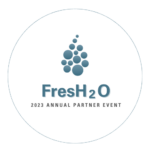The inaugural FresH2O Partner Event, hosted by the Freshwater Collaborative of Wisconsin, brought together UW System faculty and staff and partners from industry, government agencies, and nonprofits to discuss issues such as PFAS, phosphorus pollution, collaborative water research, and how to enhance the pipeline to jobs in water industries.
Jump to Key Takeaways
Jump to Plan of Action
Event Summary

The event was held at the UW-Madison Pyle Center on Wednesday, Sept. 27, 2023, from 2:00-7:00 p.m. More than 110 people registered for the event. Attendees had the opportunity to participate in two facilitated breakout sessions, whose descriptions are below.
Addressing Forever Chemicals
Learn about current PFAS research being funded by the Freshwater Collaborative. Engage with researchers working on PFAS, help identify research needs and potential areas for new collaborations among academia and industry and determine how you and/or your employer can become more involved in this issue. Download event handout of funded projects.
Identify Solutions to Phosphorus Pollution
Learn about current phosphorus pollution research being funded by the Freshwater Collaborative. Engage with researchers working on phosphorus research, help identify research needs and potential areas for new collaborations among academia and industry and determine how you and/or your employer can become more involved in this issue. Download event handout of funded projects.
Collaborative Research: The Wisconsin Idea at Work
How can undergraduate research programs benefit the community and train students for the workforce? Learn about the various undergraduate research programs taking place across the state. Engage with faculty and staff working on similar topics to identify ways to collaborate. Share water challenges your employer or community are dealing with and discuss how undergraduate researchers can contribute to solutions. Download event handout of funded projects.
Internships: Building a Pipeline to Jobs
What will it take to train tomorrow’s workforce and create a pipeline to jobs in Wisconsin? Discuss what skills students should have before applying for an internship, how to make your internship program stronger, how to recruit interns to your organization, and more. Download event handout of funded projects.
Recruiting the Next Generation
Want to launch a water-focused camp or program for high school students on your campus? Does your campus already have a successful program and are you willing to share advice and how to avoid pitfalls? Are you a water professional interested in mentoring students? Join this session to talk about how to create, maintain and get involved in programs for high school students that will help recruit the next generation of water professionals. Download event handout of funded projects.
Following the breakout sessions, participants were invited to Connections & Conversations, a networking event where they could dive into deeper conversations with people whom they met during the breakout sessions.
Key Takeaways
Consensus is that there is a strong need for more frequent in-person and virtual events during which partners from various organizations could discuss needs, gaps in research and ways of collaborating. Of those who returned surveys, most said they would like to meet in-person once per year and virtually two-four times per year.
- Attendees would like the Freshwater Collaborative to be a statewide point of contact for academic partners, industry partners, K-12 teachers, government agencies and others to help them connect on research, internships/hiring and other ways to collaborate.
- Additional funding for research, especially funding earmarked for emerging and urgent needs, is needed.
- Attendees pointed to the need to create a statewide research agenda on PFAS and phosphorus that would include input from a wide range of stakeholders.
- Attendees in every session expressed a desire for the Freshwater Collaborative to be a communications hub for future collaborations. Ideas included
- Establishing a searchable database of research projects and experts
- Offering a platform for engaging with one another to connect with people working in similar areas, ask questions of one another, post positions for students, find collaborators, etc.
- Hosting a series of online workshops for idea sharing on a variety of topics from research to recruitment to career development for students
- Facilitating regularly scheduled working group meetings/collaborative conversations around research
Plan of Action
The Freshwater Collaborative of Wisconsin is reviewing event feedback and session notes to develop a comprehensive plan to address statewide needs. Although the Freshwater Collaborative has limited staffing (two full-time staff) and financial resources to address all the needs expressed, the staff feels confident it can work with its Steering Committee to provide enhanced communications and tools that will promote and facilitate collaboration among partners.
The Collaborative anticipates rolling out the following in 2024:
- Collaboration Groups: Similar to the FresH2O Partner Event, these virtual events will provide space for ongoing facilitated discussions in these four areas: PFAS, Phosphorus, Collaborative Undergraduate Research and Recruitment. (More information to come.)
- Collaboration Corner: This will be a standing item in the Water Words newsletter and will highlight upcoming opportunities for all partners to collaborate.
- Creation of a searchable database of all funded projects by institution and category and a GIS map illustrating where projects are taking place.
- Expansion of the internship page of website.
- Expansion of the existing Experts’ Directory to include external partners
- Launch of a Freshwater Collaborative LinkedIn group for partners as a hub for communication around water
- Webinar workshops on suggested topics
If you have questions about the event or the Collaboration Groups, please reach out to us at freshwater-collab@uwm.edu.
